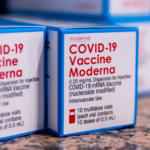
On Tuesday, public health officials approved a second round of COVID-19 booster shots for those over the age of 50, with shots to likely be available in pharmacies this week. Those 12 and older are currently eligible for a booster shot five months after their initial vaccine series if they received an mRNA vaccine like Pfizer or Moderna, or two months after getting the Johnson & Johnson vaccine.
For those over 50, officials at the Food and Drug Administration and Centers for Disease Control and Prevention have decided the data on waning immunity justifies making another shot available four months after the first boost. CDC Director Rochelle Walensky said it was especially important for those 65 and older and those 50 and older with underlying medical conditions. Walensky said on Tuesday: “This is especially important for those 65 and older and those 50 and older with underlying medical conditions that increase their risk for severe disease from COVID-19 as they are the most likely to benefit from receiving an additional booster dose at this time.”
Dr. Peter Marks, director of the FDA’s Center for Biologics Evaluation and Research, said to reporters: “If it were my relatives, I would be sending them out to do this again. Because after all, COVID-19 has had a really disproportional adverse effect on people 65 years of age and older and those with comorbidities. By choosing age 50 and up … we felt like we would capture the population that might most benefit from this fourth booster dose. Just to reiterate, the good news is that for most people who have been vaccinated and had one booster, their original booster shot is continuing to provide you with good protection from being hospitalized or dying.”
While Tuesday’s announcement only applies to older Americans, the FDA will convene a panel of vaccine experts on April 6 to discuss the plan for other age groups. They will talk about the efficacy of booster shots and the potential need for a variant-specific booster instead of continual booster shots designed for the initial strain of COVID-19. A decision would likely be made later this summer or fall.
Editorial credit: davide bonaldo / Shutterstock.com
